Agile Renovation Preps Credit Union for Hybrid Work
Q+A with First West Credit Union CEO Launi Skinner
In March 2020, First West Credit Union was completing the final touches on its new headquarters in Langley, British Columbia. Leaders envisioned a new workplace that removed silos and hierarchy, empowered people, and prioritized employee wellbeing. Credit union leaders were also seeking to become an enterprise-wide agile organization and the new space would be key to achieving their goal.
360 spoke to Launi Skinner, First West Credit Union CEO, about the project and how, coincidentally, the agile workplace they designed, positioned them to better meet the challenges of post-pandemic work.
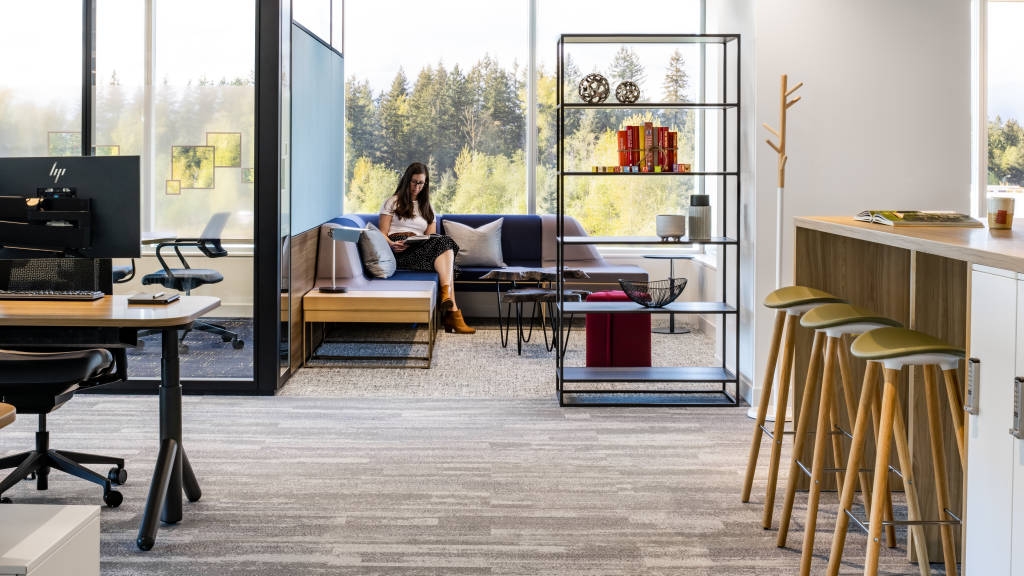
360: Why was becoming more agile important to you?
Launi Skinner: Agile is all about how to create more value-add to our membership. It elevates decision making with members in mind and it’s an iterative process where you continually make changes to the larger vision with feedback from membership. It requires the right combination of teams coming together who have the expertise to really build it out. That means you need to empower the right people to make the best possible decisions. And it also means space plays an important role in making that happen.
360: You described your trip to see Steelcase’s agile spaces in Grand Rapids as eye-opening. Why?
LS: Before visiting Grand Rapids we had actually done quite a bit of research on agile work and visited several offices in Vancouver. These companies had all done some interesting things with their cafes, meeting rooms and other areas. But what we saw in Grand Rapids was the whole thing – the entire space was considered. It wasn’t a piecemeal approach. That really grabbed me. We realized if we want to really do this, let’s do it right. And let’s do it big – and I don’t mean cost. Let’s not say, we want to do this, but then rationalize it back. We needed to consider the whole thing if we’re going to be an agile enterprise organization.
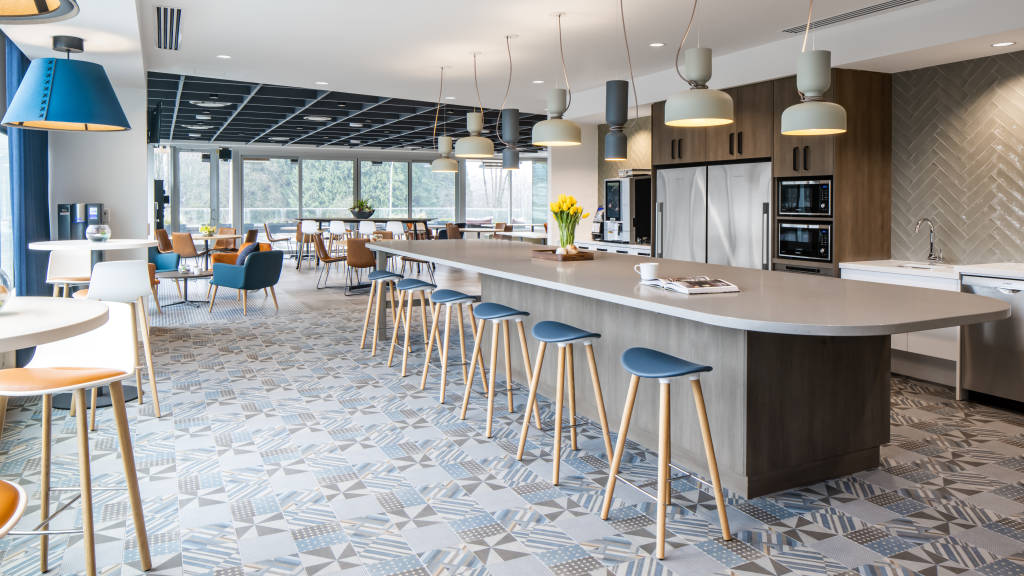
360: How well is this space addressing new employee needs as a result of the pandemic?
LS: Interestingly enough, we were already in the process of developing a work-from-home policy. We knew we needed a flexible work environment to be an agile-wide enterprise. Everything we’ve been preparing for has actually played out really well since the pandemic and it’s because we designed it to be flexible. We want our people to come to work more than be at home, but we recognize they need flexibility. So let’s give them some choice, based on the work they’re doing and the teams they’re working with.
Our space gives people lots of choice. They can choose to work in different types of settings — you can work at a stand-up desk, in a pod or move furniture around any way that works for you. It’s about equality, inclusion, diversity; everybody works differently. They have some choice when they come to work and how they work and that’s comforting given how they’re feeling about Covid and being with people.
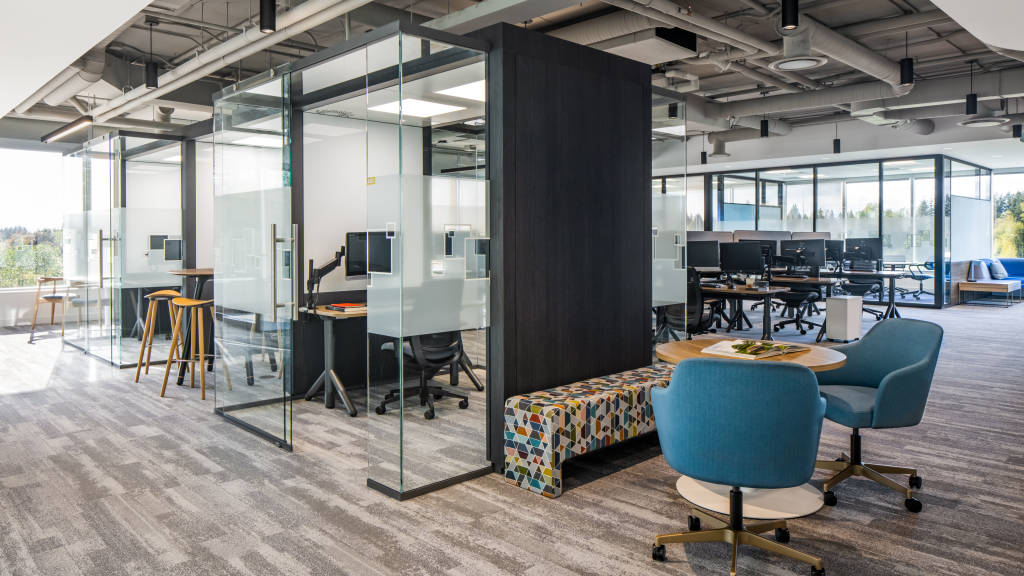
360: Do you think this space has helped in your return to office?
LS: No question. Absolutely the space helped. Our teams have been back since July 2021. The space makes people excited to come to work. At first people were a little nervous, but the big open, bright spaces and the flexibility have really helped them feel more comfortable. The cafe and outdoor spaces have also been a big draw.
When you come to work you just feel it — you feel great. The spaces are big, not crammed, the furniture can be moved around and people can have fun with the furniture. At the end of the day people would say, “I had a fun day today. I laughed. I smiled.”
360: Steelcase research has shown people say having access to privacy is more important than ever when they return to the office. What has been your experience?
LS: We have so many different choices of how and where we can work. I see some people working all over the building. We have all different sizes of rooms and booths, so when people need to have a private space, there are so many different choices. They may start at one workstation and then they’ll move throughout the day depending on their needs.
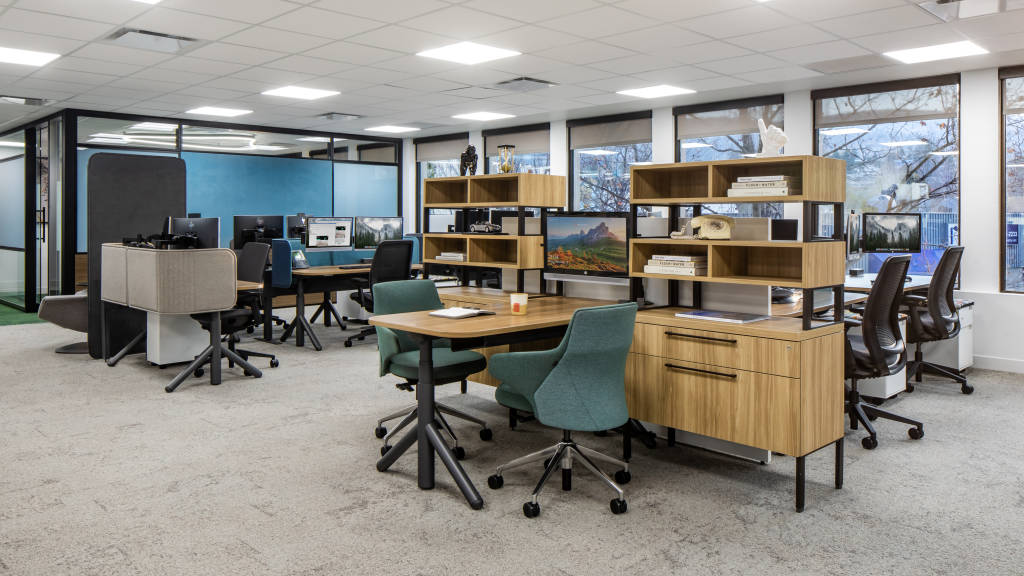
360: Many will argue, people can be just as productive working from home. Why was it so important for you to get your people back to the office?
LS: Our culture is about relationships; we are a high-touch, high relationship-based organization. That’s in our DNA and we felt sitting behind screens 100% of the time wouldn’t fit that. We have been really clear we are going to create a safe environment and expect people to come to work at a level that’s right. At the end of the day, this will be our competitive advantage.
360: What message are you trying to communicate to employees through the space?
LS: I think the new space has a freshness and vibe that says, “this is an organization that values you and understands that where you work really matters.” It’s beautiful and supports our culture. People walk in and understand this is a nice place to work – to sit and have conversations in a variety of comfortable and flexible spaces. It tells our employees that building relationships and connecting with people matters and is as important as all the other elements of work. It shows them we care about how they feel about how and where they work. If you’re going to come and spend time here, not only should it be productive and useful, it should be fun.
360: What is evidence you point to that your space is working the way you had hoped it would?
LS: For now, I would say it’s because we have everybody back at work. Not too many companies can say that. Our turnover has not changed, and even through Covid-19, we’ve delivered some amazing results this year for our membership.
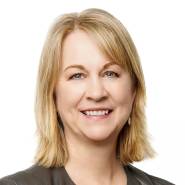
Launi Skinner is the CEO of First West Credit Union in British Columbia, one of Canada’s leading credit unions. Launi has more than 25 years’ experience managing large, complex businesses in both the U.S. and Canada. Before her current position with First West, Launi was president of Starbucks.


